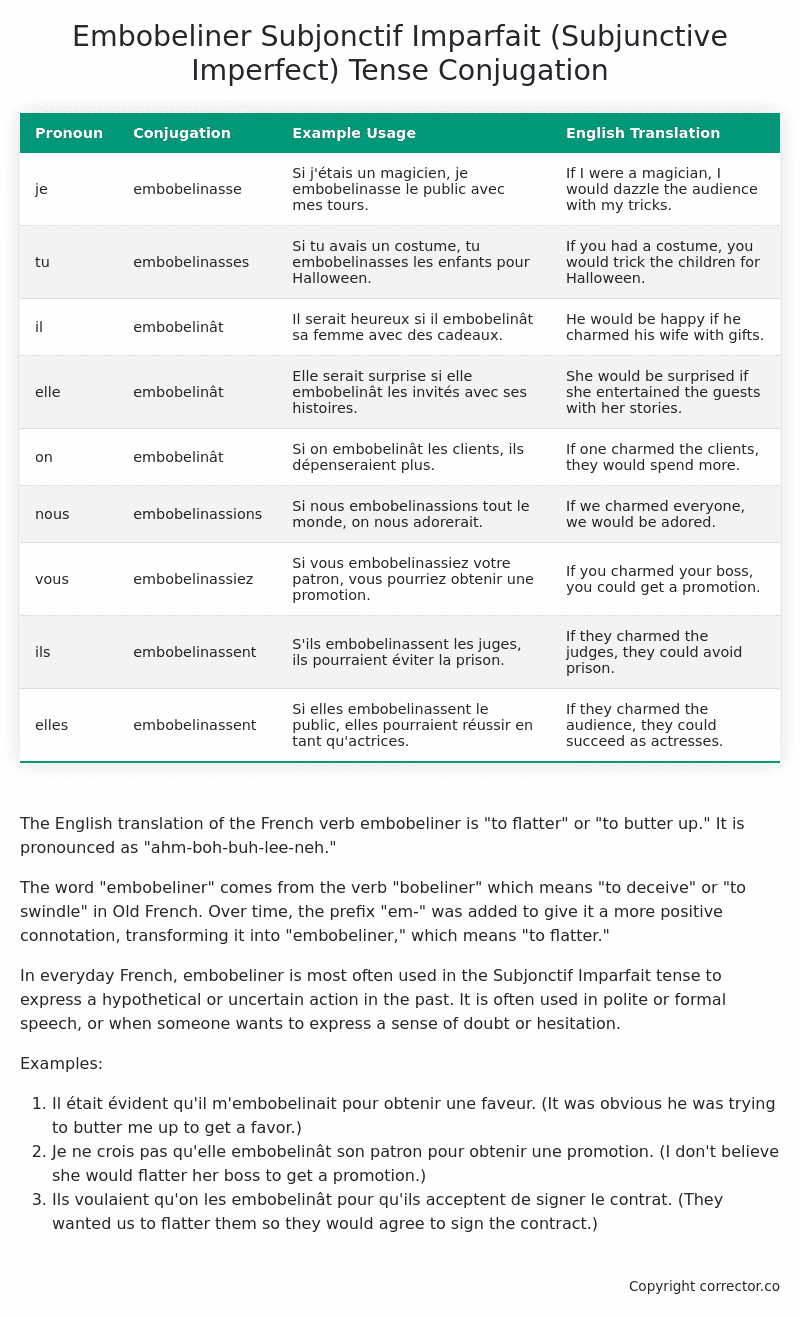Subjonctif Imparfait (Subjunctive Imperfect) Tense Conjugation of the French Verb embobeliner
Introduction to the verb embobeliner
The English translation of the French verb embobeliner is “to flatter” or “to butter up.” It is pronounced as “ahm-boh-buh-lee-neh.”
The word “embobeliner” comes from the verb “bobeliner” which means “to deceive” or “to swindle” in Old French. Over time, the prefix “em-” was added to give it a more positive connotation, transforming it into “embobeliner,” which means “to flatter.”
In everyday French, embobeliner is most often used in the Subjonctif Imparfait tense to express a hypothetical or uncertain action in the past. It is often used in polite or formal speech, or when someone wants to express a sense of doubt or hesitation.
Examples:
- Il était évident qu’il m’embobelinait pour obtenir une faveur. (It was obvious he was trying to butter me up to get a favor.)
- Je ne crois pas qu’elle embobelinât son patron pour obtenir une promotion. (I don’t believe she would flatter her boss to get a promotion.)
- Ils voulaient qu’on les embobelinât pour qu’ils acceptent de signer le contrat. (They wanted us to flatter them so they would agree to sign the contract.)
Table of the Subjonctif Imparfait (Subjunctive Imperfect) Tense Conjugation of embobeliner
| Pronoun | Conjugation | Example Usage | English Translation |
|---|---|---|---|
| je | embobelinasse | Si j’étais un magicien, je embobelinasse le public avec mes tours. | If I were a magician, I would dazzle the audience with my tricks. |
| tu | embobelinasses | Si tu avais un costume, tu embobelinasses les enfants pour Halloween. | If you had a costume, you would trick the children for Halloween. |
| il | embobelinât | Il serait heureux si il embobelinât sa femme avec des cadeaux. | He would be happy if he charmed his wife with gifts. |
| elle | embobelinât | Elle serait surprise si elle embobelinât les invités avec ses histoires. | She would be surprised if she entertained the guests with her stories. |
| on | embobelinât | Si on embobelinât les clients, ils dépenseraient plus. | If one charmed the clients, they would spend more. |
| nous | embobelinassions | Si nous embobelinassions tout le monde, on nous adorerait. | If we charmed everyone, we would be adored. |
| vous | embobelinassiez | Si vous embobelinassiez votre patron, vous pourriez obtenir une promotion. | If you charmed your boss, you could get a promotion. |
| ils | embobelinassent | S’ils embobelinassent les juges, ils pourraient éviter la prison. | If they charmed the judges, they could avoid prison. |
| elles | embobelinassent | Si elles embobelinassent le public, elles pourraient réussir en tant qu’actrices. | If they charmed the audience, they could succeed as actresses. |
Other Conjugations for Embobeliner.
Le Present (Present Tense) Conjugation of the French Verb embobeliner
Imparfait (Imperfect) Tense Conjugation of the French Verb embobeliner
Passé Simple (Simple Past) Tense Conjugation of the French Verb embobeliner
Passé Composé (Present Perfect) Tense Conjugation of the French Verb embobeliner
Futur Simple (Simple Future) Tense Conjugation of the French Verb embobeliner
Futur Proche (Near Future) Tense Conjugation of the French Verb embobeliner
Plus-que-parfait (Pluperfect) Tense Conjugation of the French Verb embobeliner
Passé Antérieur (Past Anterior) Tense Conjugation of the French Verb embobeliner
Futur Antérieur (Future Anterior) Tense Conjugation of the French Verb embobeliner
Subjonctif Présent (Subjunctive Present) Tense Conjugation of the French Verb embobeliner
Subjonctif Passé (Subjunctive Past) Tense Conjugation of the French Verb embobeliner
Subjonctif Imparfait (Subjunctive Imperfect) Tense Conjugation of the French Verb embobeliner (this article)
Conditionnel Présent (Conditional Present) Tense Conjugation of the French Verb embobeliner
Conditionnel Passé (Conditional Past) Tense Conjugation of the French Verb embobeliner
L’impératif Présent (Imperative Present) Tense Conjugation of the French Verb embobeliner
L’infinitif Présent (Infinitive Present) Tense Conjugation of the French Verb embobeliner
Struggling with French verbs or the language in general? Why not use our free French Grammar Checker – no registration required!
Get a FREE Download Study Sheet of this Conjugation 🔥
Simply right click the image below, click “save image” and get your free reference for the embobeliner Subjonctif Imparfait tense conjugation!

Embobeliner – About the French Subjonctif Imparfait (Subjunctive Imperfect) Tense
Formation
Common Everyday Usage Patterns
Interactions with Other Tenses
Subjonctif Présent
Indicatif Passé Composé
Conditional
Conditional Perfect
Summary
I hope you enjoyed this article on the verb embobeliner. Still in a learning mood? Check out another TOTALLY random French verb conjugation!


